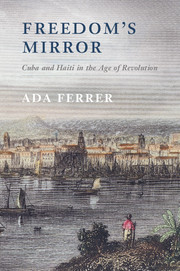
-
Select format
-
- Publisher:
- Cambridge University Press
- Publication date:
- 05 November 2014
- 24 November 2014
- ISBN:
- 9781139333672
- 9781107029422
- 9781107697782
- Dimensions:
- (228 x 152 mm)
- Weight & Pages:
- 0.64kg, 392 Pages
- Dimensions:
- (228 x 152 mm)
- Weight & Pages:
- 0.53kg, 392 Pages
- Subjects:
- Area Studies, Latin American Studies, History, Latin American History
You may already have access via personal or institutional login- Subjects:
- Area Studies, Latin American Studies, History, Latin American History
Book description
During the Haitian Revolution of 1791–1804, arguably the most radical revolution of the modern world, slaves and former slaves succeeded in ending slavery and establishing an independent state. Yet on the Spanish island of Cuba barely fifty miles distant, the events in Haiti helped usher in the antithesis of revolutionary emancipation. When Cuban planters and authorities saw the devastation of the neighboring colony, they rushed to fill the void left in the world market for sugar, to buttress the institutions of slavery and colonial rule, and to prevent 'another Haiti' from happening in their own territory. Freedom's Mirror follows the reverberations of the Haitian Revolution in Cuba, where the violent entrenchment of slavery occurred at the very moment that the Haitian Revolution provided a powerful and proximate example of slaves destroying slavery. By creatively linking two stories - the story of the Haitian Revolution and that of the rise of Cuban slave society - that are usually told separately, Ada Ferrer sheds fresh light on both of these crucial moments in Caribbean and Atlantic history.
Awards
Winner of the 2015 Friedrich Katz Prize, American Historical Association
Winner of the 2015 Wesley-Logan Prize, American Historical Association
Winner of the 2015 James A. Rawley Prize, American Historical Association
Winner of the 2015 Haiti Illumination Book Prize, Haitian Studies Association
Winner of the 2015 Marysa Navarro Best Book Award, New England Council of Latin American Studies
Reviews
‘This remarkable book addresses a fundamental paradox in the history of the Atlantic World: plantation slavery retrenched and intensified even as antislavery politics scored its first great triumph. The Haitian revolution offered the world a beacon of freedom, but it also stimulated an economic, political, and philosophical reaction, exemplified in the consolidation of slavery on an unprecedented scale in neighboring Cuba. With precision and passion, Ferrer shows how liberation and bondage made and unmade one another. Exhaustively researched and beautifully written, this is a masterwork of analytical storytelling.’
Vincent Brown - Harvard University, Massachusetts
‘Ada Ferrer treats in tandem two radically different developments that embodied the Caribbean’s experience of the Age of Revolution. Widely researched and drawing on new sources, this is a fascinating reading of two turning points in the region’s history.’
David Geggus - University of Florida
‘Drawing on archival records from Cuba, Spain, and France, Ada Ferrer has crafted a brilliant work that goes far beyond comparative history. With elegant prose and telling detail, she traces the ways in which Cubans and the Africans among them reflected on the reality of slavery and the example of freedom when they looked - and sailed - across the Windward Passage to the revolutionary society of Saint-Domingue/Haiti. This splendid book allows us to listen to and watch the soldiers, planters, runaways, and sojourners who made that crossing, or heard from those who had, and then tried to shape their own situation in the light of transformative new knowledge.’
Rebecca J. Scott - University of Michigan
'Ferrer’s contribution to Caribbean and age of revolution history is original, well researched, and accessible. Summing up: recommended.'
R. Berleant-Schiller Source: Choice
'This fine book follows untraveled paths, combining fascinating discoveries in new primary sources with refreshing interpretations of a difficult subject … offers an ongoing comparison and discussion of the interactions between two sugar islands, St Domingue, France’s richest colony during the eighteenth century, and Cuba, long neglected as an economic colony by Spain.'
Gwendolyn Midlo Hall Source: The Journal of American History
'Ferrer’s excellent book is a singular achievement, and it will serve as a baseline for the next generation of scholarship on the Atlantic’s Age of Revolution and Emancipation.'
Stuart B. Schwartz Source: The American Historical Review
'… Ada Ferrer explores the tensions that underlay two overlapping revolutions on neighboring Caribbean islands at the turn of the nineteenth century: one, a struggle against slavery that culminated in the foundation of the independent nation of Haiti, the other, a 'sugar revolution' that entrenched enslavement in Cuba … If the Haitian Revolution was intertwined with the rise of Cuban slavery, Ferrer compellingly shows, it also paved the way for ongoing challenges to the new regime, from the vessels of slave liberation outfitted by successive Haitian states to the voices of antislavery conspirators and patriot insurgents over the course of Cuba’s nineteenth century.'
Andrew Walker Source: H-Haiti
Contents
Metrics
Altmetric attention score
Full text views
Full text views help Loading metrics...
Loading metrics...
* Views captured on Cambridge Core between #date#. This data will be updated every 24 hours.
Usage data cannot currently be displayed.
Accessibility standard: Unknown
Why this information is here
This section outlines the accessibility features of this content - including support for screen readers, full keyboard navigation and high-contrast display options. This may not be relevant for you.
Accessibility Information
Accessibility compliance for the PDF of this book is currently unknown and may be updated in the future.


